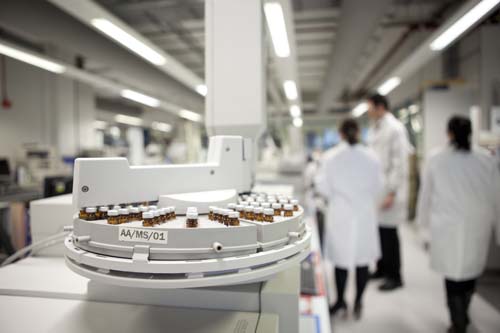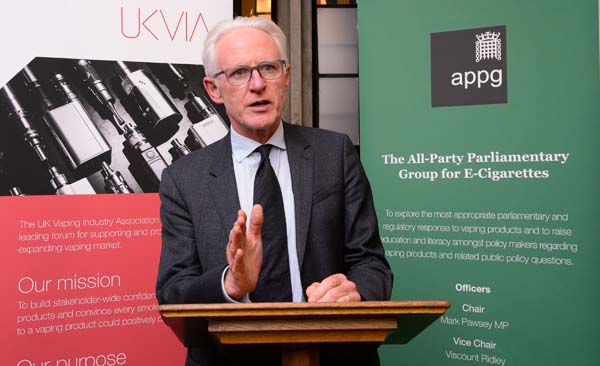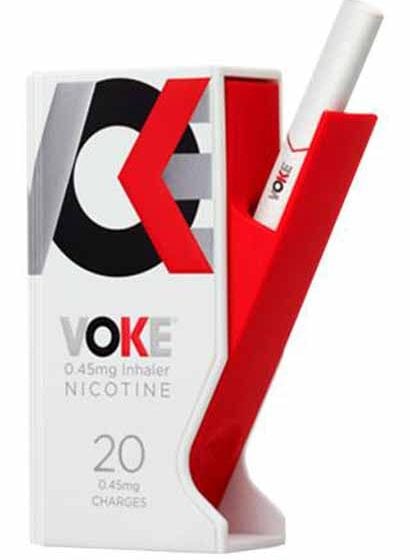British American Tobacco has welcomed a report by the UK’s House of Commons Science and Technology Committee on electronic cigarettes.
The report, which was published on Friday, said in part that e-cigarettes were too often being overlooked as a stop-smoking tool by the National Health Service
“We warmly welcome the committee’s report into e-cigarettes which offers an accurate and pragmatic snapshot of the current state of play of the e-cigarette market,” a BAT spokesperson was quoted as saying in a note posted on the company’s website.
“E-cigarettes have already helped 1.2 million smokers in UK move away from tobacco products. The Committee’s recommendations set out a useful road map for the Government to continue its progressive regulatory approach to the category which will help more smokers, who would otherwise not quit, make the switch from traditional tobacco products.
“While recognising the significant risk reduction potential of e-cigarettes, the Committee also addresses a number of challenges to realising their potential. Adopting an evidence-based approach to amending the e-cigarette product format restrictions, taxation and where they can be used will also help remove the hurdles currently facing smokers who may be looking to switch to e-cigarettes.
“At the heart of everything is the ability to communicate [,] so amending the marketing restrictions currently imposed on the e-cigarette category would allow us to correct misinformation regarding the potential reduced risk of e-cigarettes versus smoking and to communicate the availability of these product[s] to smokers.
“The report highlights that e-cigarettes should be embraced as part of tobacco cessation programs. We hope local councils and health bodies will feel confident to include e-cigarettes in their local cessation programs and that they will feel comfortable consulting with responsible industry players for the roll out of these products.
“As part of our commitment to transform the tobacco industry, we remain committed to working with local councils and public health bodies and offering smokers an ever-increasing range of high quality, innovative alternative, potentially reduced risk, products.”
Tag: United Kingdom

BAT welcomes e-cig report

Harm reduction within reach
Members of parliament have warned the UK Government that misconceptions about electronic cigarettes mean that it is missing an opportunity to tackle a major cause of death.
In a press note issued today alongside its report, E-cigarettes, the House of Commons Science and Technology Committee said that these products, estimated to be 95 percent less harmful than conventional cigarettes, were too often being overlooked as a stop-smoking tool by the National Health Service (NHS).
‘Regulations should be relaxed relating to e-cigarettes’ licensing, prescribing and advertising of their health benefits,’ the note said. ‘Their level of taxation and use in public places must be reconsidered.’
In what will be seen by many as one of its most important interventions, the Committee said that it believed the risk for smokers of continuing to use conventional cigarettes was greater than the uncertainty over the long-term use of e-cigarettes. ‘To gather independent health-related evidence on e-cigarettes and heat-not-burn products, the Committee is calling on the Government to support a long-term research programme overseen by Public Health England and the Committee on Toxicity of Chemicals in Food, Consumer Products and the Environment,’ the note said. ‘The Government should make its research available to the public and to health professionals.’
The chair of the Committee, Norman Lamb MP (pictured in 2017), said smoking remained a national health crisis and the Government should be considering innovative ways of reducing the smoking rate. “E-cigarettes are less harmful than conventional cigarettes, but current policy and regulations do not sufficiently reflect this and businesses, transport providers and public places should stop viewing conventional and e-cigarettes as one and the same,” he said. “There is no public health rationale for doing so.
“Concerns that e-cigarettes could be a gateway to conventional smoking, including for young non-smokers, have not materialised. If used correctly, e-cigarettes could be a key weapon in the NHS’s stop smoking arsenal.”
The Committee is recommending that:- ‘The Government, the MHRA (Medicines and Healthcare products Regulatory Agency) and the e-cigarette industry should review how approval systems for stop smoking therapies could be streamlined should e-cigarette manufacturers put forward a product for medical licensing.
- ‘There should be a wider debate on how e-cigarettes are to be dealt with in our public places, to help arrive at a solution which at least starts from the evidence rather than misconceptions about their health impacts.
- ‘The Government should continue to annually review the evidence on the health effects of e-cigarettes and extend that review to heat-not-burn products. Further it should support a long-term research programme overseen by Public Health England and the Committee on Toxicity of Chemicals in Food, Consumer Products and the Environment with an online hub making evidence available to the public and health professionals.
- ‘The limit on the strength of refills should be reviewed as heavy smokers may be put off persisting with them — and the restriction on tank size does not appear to be founded on scientific evidence and should therefore urgently be reviewed.
- ‘The prohibition on making claims for the relative health benefits of stopping smoking and using e-cigarettes instead has prevented manufacturers informing smokers of the potential benefits and should be reviewed to identify scope for change post-Brexit.
- ‘There should be a shift to a more risk-proportionate regulatory environment; where regulations, advertising rules and tax duties reflect the evidence of the relative harms of the various e-cigarettes, heat-not-burn and tobacco products available.
- ‘NHS England should set a policy of mental health facilities allowing e-cigarette use by patients unless trusts can demonstrate evidence-based reasons for not doing so.
- ‘The Government should review the evidence supporting the current ban on snus as part of a wider move towards a more risk aware regulatory framework for tobacco and nicotine products.’
In welcoming the report, the UK’s New Nicotine Alliance (NNA) said that it contained several evidence-based policy proposals that would positively transform the way vaping was viewed by businesses, institutions and the public alike.
It said that it ‘warmly welcomes this report for its clear and unequivocal message that e-cigarettes and other alternative nicotine products are far safer than combustible tobacco and should be treated as such’.
“E-cigarettes are a proven safer alternative to smoking and the UK boasts 1.5 million former smokers who have converted from combustible tobacco to exclusively vaping instead,” said Sarah Jakes, the NNA chair. “The Science and Technology Committee has wisely recognised that misconceptions about e-cigarettes are threatening further progress in encouraging their use by smokers who choose to quit.
“We welcome the Committee’s call for a root and branch review of how risk-reduced products are treated by businesses, institutions and government itself. The report is a beacon of enlightenment in an area of public health which is often burdened by dogma and outdated thinking towards the use of nicotine…”
Jakes said also that there was a lot of confusion about e-cigarettes among the public, health institutions and businesses; so the report was timely and could have hugely positive implications for public health if its recommendations were implemented in full.
“Sir Norman’s Committee has done an excellent job of peering through the mist of misunderstanding surrounding e-cigarettes and its policy proposals can go a long way to dispel the – often deliberately fabricated – misconceptions that are deterring many thousands of smokers from switching,” she said. “We would urge the government to read the Committee’s findings carefully and act on them without delay”
Commenting on the report, the Vaping Industry Association (UKVIA) said that, following an extensive inquiry into e-cigarettes, the Committee had concluded that the government was missing significant opportunities to tackle UK smoking rates.
The UKVIA highlighted that the Committee had urged the government to consider tax breaks for vaping products; to allow wider use of vaping in public places; and to create a streamlined route to medically licenced vaping products.
It pointed out too that the report called on the government to reconsider the regulations around e-cigarette packaging and advertising. ‘Advertising rules currently prevent the industry from making health claims comparing vaping to smoking,’ said the UKVIA. ‘The Committee believes this is stopping UK smokers (almost seven million), from making informed decisions about switching to vaping …’
The report said also that restrictions on nicotine strength, tank size and bottles was not founded on scientific evidence and should be urgently reviewed.
“The Science and Technology Committee report is a ringing endorsement of vaping’s public health potential,” said John Dunne, who appeared before the Committee on behalf of the UKVIA.
“They are absolutely right that advertising restrictions are preventing smokers from hearing the truth. More and more people wrongly believe vaping to be more harmful or as harmful as smoking. This is a direct consequence of advertising restrictions that prevent the industry from telling smokers that vaping is 95 percent less harmful. If health bodies can say it, why can’t we?
“The industry is pleased to see the Committee recognise the nonsensical packaging and nicotine strength regulations, that only hamper vaping’s potential appeal to smokers looking for an alternative.”
Qualified support
The smokers’ group Forest has issued a qualified welcome to a report by the House of Commons Science and Technology Committee on electronic cigarettes.
Forest welcomed a call by MPs on the Committee to relax e-cigarette advertising regulations and to review the current limit on the strength of refills and the restriction on the size of tanks.
But it warned against medical licensing of e-cigarettes.
“We welcome the Committee’s open-minded approach to e-cigarettes,” said the director of Forest, Simon Clark.
“We agree that, post-Brexit, manufacturers should be allowed to inform smokers of the potential health benefits of switching to e-cigarettes.
“We agree too that the limit on the strength of refills and the restriction on tank size should be reviewed.”
But on the subject of medicinal licensing, Clark warned that such a move could damage the appeal of vaping for millions of smokers.
“The success of e-cigarettes to date has been based on the fact that they allow smokers who want to quit to switch to a product that, for many people, is as pleasurable as the cigarettes they are giving up,” he said.
“Aligning e-cigarettes with products such as nicotine patches and gum could be counter-productive.”
Evoking a new nicotine era
Voke, the nicotine inhaler that was granted a medicinal-product licence in the UK in 2014, is expected to be launched onto the market next year.
In a press note issued earlier today, Kind Consumer Holdings Limited, the company behind Voke (pictured as it was in February 2017), said the product had been delayed getting to market by issues surrounding the scaling-up of its manufacturing process.
However, the company, which in January 2017 took direct responsibility for manufacturing the product, had now raised further funding from existing and new investors, funding that would be used ‘to complete set up of state-of-the-art manufacturing capacity for Voke and to start recruitment of key marketing personnel to support the UK market launch due in 2019’.
“This funding is another step towards commercialisation of Voke, a product which promises to make a real difference to the health burden of smoking by offering an alternative to smoking for smokers and those around them,” Paul Triniman, CEO of Kind Consumer, was quoted as saying.
The Voke 0.45mg Nicotine Inhaler was granted a medicinal product licence from the UK Medicines and Healthcare products Regulatory Agency in September 2014, but it will be launched as an over-the-counter General Sale List product in the UK.
The product delivers a nicotine formulation via a breath-operated valve in a cigarette-sized medical device. Its technology, which is protected by more than 340 granted worldwide patents, contains no electronics, and does not use heat or combustion.
Kind Consumer said the 0.45 mg nicotine dose had been clinically proven to provide effective craving relief.
It said the product could be used discreetly, generating no visible exhalation and no odor.
Tax smokers, not vapers
If the UK Government increased the cost of vaping through the imposition of taxes on electronic cigarettes it would discourage the very thing it was trying to encourage: the switch from smoking to vaping.
This was the essence of a statement by Dan Marchant, director of the Vape Club and board member of the UK Vaping Industry Association, following the publication of stories suggesting that the Government was considering taxing electronic cigarettes as part of its autumn budget.
One aim of the tobacco control plan, Marchant said, was to reduce smoking prevalence among people within the lowest earning brackets. Increasing the cost of the most effective alternative to smoking would not help achieve this goal. In fact, it would do the opposite.
Switching from smoking to vaping provided harm reduction benefits, but another of its attractions was that it offered significant monetary savings. Increasing the cost of vaping would decrease its attractiveness to smokers and have a detrimental effect on encouraging people to move away from tobacco.
The best thing smokers could do for their health, Marchant said, was to quit smoking. However, the evidence was increasingly clear that the use of e-cigarettes was significantly less harmful than was smoking tobacco. The government sought to support consumers in stopping smoking by adopting the use of less harmful nicotine products. At the same time, Public Health England (PHE) had produced guidance for employers and organizations looking to introduce policies on e-cigarettes and vaping in public, and had recommend such policies be evidence-based. PHE recommended that e-cigarette use was not covered by smoke-free legislation and should not routinely be included in the requirements of an organization’s smoke-free policy.
Meanwhile, Marchant said that maintaining high duty rates on tobacco products was a proven and effective means to reduce smoking. As well as providing an incentive to quit for those who smoked, it provided a disincentive for young people to take up smoking.
‘Although national smoking prevalence continues to decline, the picture is not so positive for all groups and communities across England,’ he said. ‘Smoking remains highest among populations who already suffer from poorer health and other disadvantages.
‘In 2015, there were almost three times as many smokers among the lowest earners in our society in comparison to the highest earners. In 2016, the prevalence of smoking among people working in jobs classed as routine and manual was more than double that of people working in managerial and professional occupations. If we are to achieve the first smoke-free generation and break this cycle, we must support those populations where smoking rates remain high to quit.’
Marchant said that rather than taxing vapers, the Government should further increase the ‘sin-tax’ on cigarettes. This would raise more money since there were more than seven million smokers and 2.8 million vapers, half of whom still smoked to some degree. Such a strategy would fit with the Government’s tobacco control-plan guidance.
Taxing times for vaping
UK vapers could be hit with excise tax in this autumn’s budget, according to a story by Lynn Davidson for The Sun.
Davidson quoted Whitehall sources as saying that so-called ‘sin taxes’ would be increased in this autumn’s Budget.
And one was said to have told the Sun that vapers were likely to be hit because they were not taxed at all [outside of VAT].
Pro-vaping activists have rallied round to point out that vaping is not a sin, though this is unlikely to cut much ice because the Chancellor won’t dress it up that way and, anyway, nor is driving a car but fuel is the subject of excise.
What might deter the Chancellor is the fact that the Government is aware that vaping has saved the National Health Service (NHS) billions of pounds and could save it more. As part of making its decision, his team will no doubt calculate whether the reduction in NHS savings caused by smokers being put off switching to vaping by the tax-induced increase in electronic-cigarette prices would be more than offset by the additional tax revenue. The former, of course, is merely a calculation, while the latter is cash in hand.
Still, the NHS savings figures seem impressive. The UK Vaping Industry Association (UKVIA) pointed out that, according to Action on Smoking and Health (ASH) figures, of the nearly three million UK vapers, more than half had given up smoking, and 97 percent were either smokers or ex-smokers.
It said that the value of health gains associated with a single successful quit attempt was £74,000 according to the Medicines and Healthcare products Regulatory Agency, and therefore, the ASH figures suggested that vaping had already saved the UK in the region of £111 billion.
And it could save more, though it had to be borne in mind that the principal reason for people switching to vaping from smoking was that vaping was substantially cheaper.
BAT’s profit soars
British American Tobacco’s cigarette volume during the six months to the end of June, at 345 billion, was down by 3.1 percent on that of the six months to the end of June 2017 [when the 2017 six-month results were presented, volume was give as 314 billion, which would indicate that volume had increased by about 10 percent, but volume figures for the first half of 2018 have been given on a ‘representative basis’ – as if BAT had owned RAI and other acquisitions, completed in 2017, from 1 January 2017.]
BAT’s tobacco-heating-product (THP) volume, during the six months to the end of June, at 3.3 billion sticks was increased by 855 percent on that of the six months to the end of June 2017; so the company’s combined cigarette and THP volume fell by 2.2 percent to 348.3 billion.
BAT’s oral-tobacco-product volume was up by 1,093 percent to the equivalent of 4.4 billion sticks; its vapor volume, measured in 10 ml units, was up by 160 percent to 77.6 million; and its other-tobacco-product volume, which includes roll-your-own and make-your-own products, was down by 6.9 percent to 10.3 billion stick-equivalents.
BAT’s revenue during the six months to the end of June, at £11,636 million, was said to be up by 56.9 percent on that of the six months to the end of June 2017.
Profit from operations was up by 72.4 percent to £4,438 million, while basic earnings per share were down by 3.4 percent to 117.7p.
In announcing the half-year results, CEO, Nicandro Durante, said the company’s strategy was to continue to grow its combustible business while investing in the ‘exciting’ potentially reduced risk categories of THP, vapor and oral. As the Group expanded its portfolio in these categories, it would continue to drive sustainable growth.
‘In the first six months of 2018, the Group continued to perform well,’ he said. ‘The cigarettes and THP portfolio has outperformed the industry as market share grew 40 basis points (bps) with a tobacco price mix of approximately four percent which is expected to strengthen in the second half of the year.
‘The performance of Reynolds American Inc. (RAI) since acquisition is encouraging and the Group’s diverse NGP portfolio has grown strongly. The foreign exchange impact on the Group’s results was a headwind of eight percent for the first six months of the year and is estimated to be 5-6 percent for the full year, based upon the current foreign exchange rates.
‘Despite the recent slowdown in the THP category in some markets, including Japan and South Korea, we remain confident of exceeding £1 billion of reported revenue in NGP in 2018 as we expect a range of new launches to re-energise growth in THP in the second half of the year.
‘We anticipate another good year of adjusted earnings growth at constant rates of exchange.’
Anti-smuggling campaign
The UK’s Tobacco Manufacturers’ Association (TMA) has launched a nationwide campaign to help fight the illegal trade in tobacco products.
In a press note issued yesterday, the TMA said posters would be displayed on telephone boxes in 50 illicit-tobacco hot spots across the UK so those tempted to buy or sell cheap illicit tobacco were warned of the consequences.
The campaign encouraged those who were aware of illicit tobacco, but who didn’t buy or sell it, to report any suspicious activity to HM Revenue & Customs.
The campaign, the TMA said, would be waged also at the UK’s busiest port and various airports to remind people who bring tobacco back from abroad that it was illegal to sell it on without paying UK taxes.
‘The campaign has been developed following research which has found that many adult smokers are unaware of or simply disregard the law,’ the note said. ‘This campaign will therefore “nudge” smokers away from the illicit market by reminding them of what is legal and what is not and raise awareness of the HMRC illicit trade reporting hotline.’
Posters have been put up in 50 locations in Cardiff, Glasgow, Perth, Dundee, London and Manchester, while billboards are being displayed at Dover international sea port and at the airports of Glasgow, Glasgow Prestwick, East Midlands, Manchester, Cardiff and Belfast.
‘Illegal tobacco is a major social problem,’ said the note. ‘According to HMRC, it cost the government £2.5 billion in lost taxes in 2016-17 which in turn puts important public services at financial risk. Moreover, it brings crime into local communities, hurts small independent retailers and the profits from illegal tobacco have been known to finance terrorism and organised criminal gangs.
‘It has been estimated that the sale of illicit tobacco made criminals more than £1.5 billion and cost the small retail sector more than £1.7 billion in revenue.’
“The tobacco industry is committed to helping fight the illegal tobacco market which impacts communities, public services and small retailers,” said Giles Roca, director general of the TMA.
“The Government needs to commit greater resources to tackling illegal trade and needs to consider innovative solutions post-Brexit to halt the flow of cheap foreign tobacco into the country.”
A cautionary tale
The New Nicotine Alliance (UK) has welcomed ‘the bold vision’ a UK MP in highlighting the increased role that tobacco harm reduction could play in the future of tobacco control policy.
In a press note issued on Friday, the Alliance said that, in a debate on the Government’s Tobacco Control Plan in the House of Commons on July 19, Sir Kevin Barron had highlighted the gulf between the UK and Ireland, two countries with identical traditional tobacco control policies but with differing approaches to electronic cigarettes. Between 2012 and 2016, smoking had dropped by nearly a quarter in the UK, while in Ireland, where e-cigarettes were viewed with suspicion, the smoking rate had risen.
‘Sir Kevin, who has 20 years’ experience of government policy surrounding tobacco, suggested that a “proper harm reduction strategy” which further welcomed the advent of innovative nicotine delivery products could deliver significant further benefits to public health in the UK,’ the press note said.
‘The NNA applauds Sir Kevin’s bold vision of the increased role that tobacco harm reduction could play in the future of tobacco control policy and calls on Under-Parliamentary Secretary of State, Steve Brine, to be less cautious and to commit to promoting a better understanding of risk-reduced products amongst health authorities under his charge.’
“E-cigarettes are a proven safer alternative to smoking and the UK boasts 1.5 million former smokers who have converted from combustible tobacco to exclusively vaping instead,” said NNA chair Sarah Jakes (pictured). “Sir Kevin’s comments are most welcome, but it is continually disappointing that Steve Brine is reluctant to recognise the part that recreational use of these products can play. Instead of adhering to a goal of total nicotine abstinence, it would be better to install policies which would encourage long-term use of alternatives.
“As mentioned during the debate, many smokers genuinely enjoy smoking and view giving up smoking as giving up on an enjoyable part of their life. Devices that can deliver the nicotine they enjoy without the harm of combustible tobacco are a perfect solution for huge numbers of people. Government should be more understanding of the pleasure that nicotine can deliver and of the reasons that current smokers continue to smoke.
“Pleasure should not be a dirty word when it comes to nicotine, just as it isn’t when talking about a pint in the pub or a welcome coffee in the morning. It is the combustion of tobacco which causes the harm, and if smokers are more confident in trying reduced-risk products, there will be even more future public health successes, like the ones highlighted by Sir Kevin yesterday [July 19].
“The UK is regarded worldwide as a global leader in tobacco harm reduction and the results speak for themselves, therefore we hope that Mr Brine will show more leadership, and less caution, towards safer nicotine products to better enable him to achieve the ambitious targets that he has set in the government’s Tobacco Control Plan.”
Don't say a word
The UK Government has said it will take Philip Morris to court unless it stops illegally targeting UK consumers with tobacco adverts, according to a story by Katie Morley for the Electronic Telegraph.
Earlier this week the Department of Health reportedly sent a formal order to Phillip Morris telling it to remove poster adverts for ‘healthier’ tobacco products from shops around the UK.
Speaking to the Daily Telegraph, the public health minister, Steve Brine, warned that the department was prepared to take legal action against Phillip Morris to protect UK consumers from being targeted by the adverts.
Advertising tobacco can result in a financial penalty or custodial sentence of up to six months.
Phillip Morris denies the adverts are illegal and says it wants to help smokers by providing them with better tobacco alternatives.










